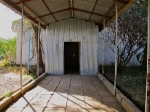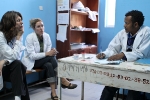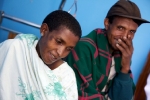… continued from Chapter One of Ethiopia’s Daughters
Chapter Two
 Without running water, sterility is difficult and conservation is everything, even during surgery. Faded green gowns and drapes, homesewn lap sponges, recycled tubing, everything in the operating room is used again and again. We enter building 24, the operating theater. A clear plastic apron, battered from use, is placed over our heads and tide in the back. I run my hands under trickling water from a bucket, passing the soap to Dr. Philippa, we scrub for surgery. A sweet smelling purple alcohol dries our fingers.
Without running water, sterility is difficult and conservation is everything, even during surgery. Faded green gowns and drapes, homesewn lap sponges, recycled tubing, everything in the operating room is used again and again. We enter building 24, the operating theater. A clear plastic apron, battered from use, is placed over our heads and tide in the back. I run my hands under trickling water from a bucket, passing the soap to Dr. Philippa, we scrub for surgery. A sweet smelling purple alcohol dries our fingers.
Putting patients under general anesthesia at our Hospital is an amazing feat undertaken only by one, a recent graduate of the nurse anesthetist school. Without the ability to monitor blood pressure, oxygenation, blood count or really anything else during our case, he does an exceptional job of keeping our patient stable. I’m in awe of what little maintenance will keep a patient alive. I feel this is what surgery must have been before technology or electricity.
Fingers across her taught belly, a lateral incision is made. It is now obvious the uterus has ruptured just as the midwife Abraham had predicted. We pull gently, dislodging the lifeless baby from her torn womb and pass it to the nurse. A quietness overcomes us all.
There is little time to be sad as we shift our focus to the mother, Samanesh. Working quickly, Dr. Philippa’s nimble fingers stop the bleeding as she removes the uterus and repairs the vaginal wall. Dr. Frantilal, a young local General Practitioner, his dark eyes concerned behind the mask, ponders our decision to save her right ovary, ‘I have never seen this done before.What is the use of this?’
‘Wouldn’t you prefer I save a testicle if I could?’ asks Philippa.
In remote rural areas, there are no roads, only narrow foot paths. Sometimes a six hour walk is required to reach a bus stop. And then they wait, wait for an overcrowded bus to transport them to the district hospital. During the rainy season, foot bridges are washed away, roads eroded, making the journey even more arduous. Often without shoes, these women labor on route.
Samanesh’s forehead perspired, she was familiar with birth, this was her fifth pregnancy. Her ‘pushing down pains’ began at home, surrounded by family, far from the hospital. Hours passed as the baby’s head wedged high in the birth canal, unable to slip into position for delivery. Labor stalled. A sense of urgency, something was wrong, her life was now in danger. Her family began the long procession to the hospital. Hours later, Samanesh arrived exhausted, bleeding and the baby no longer kicking in her belly.
 Poverty, lack of education, malnourishment and the devaluation of women are obstacles in developing nations for a safe delivery. Once these are rectified, one issue remains at hand- access. While numerous health centers are within hours from each other, the hospitals are few and far between, once you reach a hospital there may be no physicians on staff, not to mention no operating room or surgeon. The WHO reports there are more Ethiopian doctors in Chicago then there are in Ethiopia. Lack of transportation and lack of roads are a standing problem for these women.
Poverty, lack of education, malnourishment and the devaluation of women are obstacles in developing nations for a safe delivery. Once these are rectified, one issue remains at hand- access. While numerous health centers are within hours from each other, the hospitals are few and far between, once you reach a hospital there may be no physicians on staff, not to mention no operating room or surgeon. The WHO reports there are more Ethiopian doctors in Chicago then there are in Ethiopia. Lack of transportation and lack of roads are a standing problem for these women.
Early mornings we walk through the rusted blue hospital gate to make rounds, the maternity ward, building 28, is just waking, newborns crying out to suckle, birds chirping, staff yawning. We check our patient’s vital signs, looking for infection, any signs of decompensation. Samanesh’s devoted family remains at her side, they feed her injera and chai, change bed sheets and sponge her tired body clean. Days later her fever resolves and we stop the intravenous antibiotics. A week passes, her incision heals, she is able to return home with her husband. She returns a sister, a mother, a wife, a daughter.
[smooth=id:38]
to be continued…



 Follow
Follow
February 17th, 2011 by becca
“‘Wouldn’t you prefer I save a testicle if I could?’” Go Philippa!
February 5th, 2011 by The Elephant Cloud — Ethiopia’s Daughters: Chapter III
[…] … continued from Chapter Two of Ethiopia’s Daughters […]
February 1st, 2011 by Dianne / Mom
Thank you. All I can say is bless you all .
January 30th, 2011 by devora
oh…. oh…. tears….